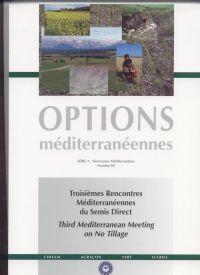| Article précédent | p. 43-55 | Article suivant |
Soil quality and carbon sequestration: Impacts of no-tillage systems
Plowing or soil inversion is a principal cause of CO2 emission from croplands. No-tillage (NT) adoption is an essential step to sustainable agriculture. The use of NT significantly improved soil aggregation and carbon and nitrogen sequestration in the surface of the soils. In both tropical and temperate soils, a general increase in C levels was observed under no-tillage compared with conventional tillage. No-tillage can improve soil structure and stability thereby facilitating better drainage and water holding capacity that reduces the extremes of water logging and drought. Particulate organic matter was a more sensitive indicator of soil quality changes under different tillage and stubble management than total organic carbon. These improvements to soil structure also reduce the risk of runoff and pollution of surface waters with sediment, pesticides and nutrients. Under no-tillage, a richer soil biota develops that can improve nutrient recycling and this may also help combat crop pests and diseases.
- [ Afficher ]
- [ Télécharger ]
- [ Exporter la citation ]
Vous pouvez télécharger la citation au format :
- [ Imprimer ]
-
Mots-clés
CARBONE, DURABILITE, SEMIS DIRECTCiter cet article
Mrabet R. Soil quality and carbon sequestration: Impacts of no-tillage systems. In : Arrue Ugarte J.L. (ed.), Cantero-Martínez C. (ed.). Troisièmes rencontres méditerranéennes du semis direct . Zaragoza : CIHEAM, 2006. p. 43-55. (Options Méditerranéennes : Série A. Séminaires Méditerranéens; n. 69). 3. Mediterranean Meeting on no Tillage, 2006/03/23-25, Zaragoza (Spain). http://om.ciheam.org/om/pdf/a69/06600084.pdf



